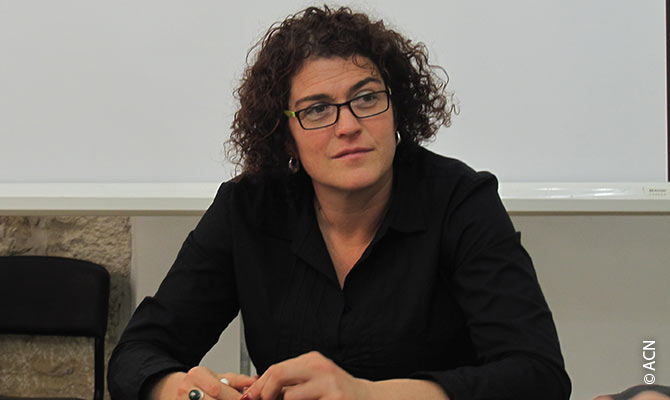Hana Bendcowsky is the program director of the Jerusalem Center for Jewish – Christian Relations (JCJCR). The program is supported for years by ACN. She maintains despite the Gaza war the dialogue between Jews and Christians in Israel.
ACN: Mrs. Bendcowsky, Is Jewish-Christian dialogue possible in these days after the conflict? The majority of Christians are Arab. So they probably favor the Palestinian side.
Jewish-Christian dialogue in this region is always Jewish-Israeli – Palestinian-Christian dialogue and the political conflict is an inescapable part of the Jewish-Christian dialogue. The religious and national identities are entwined and the majority of our work is with the local Palestinian community. Thus there is less theological dialogue here and more dialogue around the complex realities and identities of the different communities in the Holy Land.
How religious is the conflict between Israelis and Palestinians? Or is it at its core a national conflict?
Although the conflict is not at its foundation a religious conflict, people’s religious and national identities cannot be separated – and the religious elements of the conflict have grown more significant over time, as the religion-nationalist narratives gain influence in society as a whole.
But isn’t dialogue difficult due to these identities?
Even during outbreaks of violence such as we just experienced, we continue both our dialogue and educational work – educating about the Arab-Palestinian-Christian communities, their deep connection, roots in and commitment to the Holy Land, their heritage, beliefs, and traditions – and of course, relating also to their responses to the current situation. In our dialogue programs, such as Meeting Place, Open House and Dialogue and Identity, the trust that we have worked so hard to build, both within the staff and within the groups themselves, has enabled the groups to keep talking, to share their experiences and understanding of what is happening around them, and to be empathetic to the suffering on all sides.
What is it concretely that JCJCR is doing to bring Jews and Christians together?
The Healing Hatred project that is being supported by ACN is using methods of spiritual consulting in the context of the conflict and in many of our dialogue groups in university and in the Open House in Ramle the facilitator used the method in order to discuss the current situation. The method demands the participants to talk about their personal experience and not to talk about “the situation”. Students expressed fear and concern.
At one time they were stuck in university and couldn’t leave the campus because there were riots outside the campus and they sat together and talked about their personal concerns using the unique method of Healing Hatred. In the current events, as it happened last month, people tend to talk about “the Arabs”, the coexistence that is fragile or the violence of the other side. So instead of talking about that, the facilitators encouraged the students to talk not about “the situation” but to share their fears, their fear to walk in the streets, to speak their languages. Both Jews and Arabs expressed similar fears. When you look at the situation from a personal perspective it receives a very human perspective.

How have you personally and your colleagues lived through the days of conflict?
The conflict has impacted all members of the Rossing staff – including damage to the cars of three staff members – one Jewish and two Arab. Both Jewish and Arab members of staff who live in the center of the country had to take shelter during rocket attacks – and the streets of all the mixed cities, including Ramle where we have our new center, did not feel safe for anyone. We have devoted significant time as a team to make space for ourselves as a team to share experiences and discuss different events as they unfolded. We will need to devote additional time in the coming weeks and months to see if and how we need to adapt our programming to the new realities.
So dialogue continued even during the days of conflict.
All of our initiatives, as well as many of those of other organizations, have continued throughout the conflict – as I have told you, one of our university groups was stuck on campus for a while whilst rioters were dispersed outside. In Ramle, a mixed city that saw significant tension and violence, we have not only continued our groups, meeting online if necessary to guarantee participants’ safety, but we are now setting up a series of dialogue circles to enable residents of the town to talk about what happened and begin to think where we go from here. In all cases, our trained facilitators do their utmost to ensure a safe space for everyone, where people can listen and understand each other, even when they do not agree on the narrative of events, and even though participants express fear, anger, frustration, and many other “negative” emotions.










